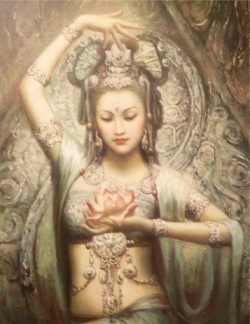The Seven Shrine Offerings
MAKING OFFERINGS is part of the practice of Buddhism, and certain offerings are apparent on every shrine that is done in the traditional way. However, these offerings are much more than a ritualistic system and form, they are a viable extension of the commitment to serve all beings. Khenpo Karthar Rinpoche gave the following explanation of the seven shrine offerings during the Amitabha Seminar of July, 1981.
The making of offerings is an antidote to the pattern of attachment and greed. There is a material aspect to offerings, where a person offers from his or her possessions something particularly valued. Or someone may symbolically offer the totality of their possessions with the thought of bringing about benefit for all sentient beings, that the material deprivation of all beings may be remedied and their perfection of generosity take place. In general, offerings on a shrine are in a set of seven, in seven bowls, and there are specific meanings for each of the seven offerings.
Drinking Water
The first offering is that of pure drinking water. It is offered with the thought that whatever benefit one accumulates may, for the present, bring about the annihilation of suffering through thirst among beings. Especially beings in realms such as the pretas, or hungry ghosts, may receive relief from the suffering of thirst. The offering is also made so that ultimately all beings may be permeated by loving kindness and compassion.
Bathing Water
Bathing and drinking waters are offered to the body of the Buddhas, not because they are thirsty or need cleansing, but because by making such an offering to the objects of refuge, sufficient merit may be gained to bring about physical purification and cleansing of our own bodies, which are subject to negativity and are very vulnerable. The offering is also made, ultimately, to dissolve obscurations that interfere with meditation, that block Dharma understanding, and to purify all obstacles to Dharma practice.
Flowers
The third offering is the offering of flowers to the awakened ones to beautify their surroundings, though the gift of flowers is quite unnecessary in the perfection of their Buddha realms. Again it is for the benefit of those who make the offering and it is made with the intention that all beings might find noble forms to inhabit, and ultimately, that all beings might embody in their forms all of the marks and attributes of enlightenment, like the awakened ones.
Incense
Incense, or good fragrances, are offered not because the Buddhas and Bodhisattvas are in need of assistance to get rid of any bad odors. Rather, incense if offered so that the annihilation of all unpleasant and unhealthful smells may take place, and, ultimately, that the merit accumulated might bring about the realization of perfection of the profound scent of discipline. It has been said that whoever has perfected the discipline is surrounded by a sweet fragrance.
Light
The fifth offering is the offering of the lamp. The awakened ones, seeing through their wisdom eyes, have no need for such a small light, yet the offering of it is made with the thought that ignorance may be purified in all beings. It is made so that ultimately the merit of such offerings of light might cause the transcendental knowledge and experience to become manifest in all beings just as it has in the Buddhas and enlightened ones.
Perfume
Of course, the radiant and perfect bodies of the awakened ones have no real need of an ordinary perfume in their experience of spontaneous perfection, but we make the offering so that temporarily all negative patterns may be purified, such as aggression, ignorance and attachment, and that ultimately not only the habitual patterns of beings but also the outer environment may become purified and perfected.
Food
The seventh offering is the offering of food. The awakened ones have no need to indulge in material food offerings, but the purpose of such offerings made to the enlightened objects of refuge is to temporarily relieve suffering that beings experience through hunger and starvation, and to bring about an abundance of food. Ultimately, the offering is made so that beings may experience the perfect state of meditation, of samadhi, and that all beings may live on the spontaneous food of meditation.
It is important that one knows the purpose and symbolism of these offerings, and that whether one is able to offer one single bowl or many, one realizes that the importance lies in the attitude with which one makes the offering to the enlightened objects of the refuge, the sources of all inspiration. Offering is an occasion for the accumulation of inexhaustible merit. One offers what one can. The more sincerely offerings are made, the more one will find themselves surrounded by an abundance of what has been offered.
Making the seven offerings is not just a limited cultural thing, relating only to a tradition or cultural ritual. If that were all it signified, then it would be a waste of time to discuss it in a teaching session. But it is something that is universally important and meaningful.
Upon examination you might find that you are making offerings for other than the reasons already mentioned. Maybe it is an exotic thing to do, or you do it because someone else is doing it, or from a sense of jealousy or competition, but these are not the correct attitudes. Instead of bringing about the accumulation of meritorious qualities, such ideas could bring the opposite, sowing much negativity for the future.
There is a story about a Kadampa monk who was used to making simple offerings. One day his benefactors were coming to visit so he woke early and made a very elaborate and detailed offering. When it was done he looked at the offering which he had so painstakingly prepared, observing that it looked very fine. But while sitting there looking at it he asked himself, "Why did I make such elaborate offerings on this day of all days, when on other days my offerings are very simple?" He realized that it was just because his patrons were coming that he had done this. So he grabbed a handful of ashes from his fireplace and threw it on the offerings, creating a great mess on the shrine. He sat filled with remorse at his ugly attitude and could not help but cry. When his patrons appeared he sat in tears with his shrine and robes covered with dirt, looking forlorn. The patrons inquired if a thief had come and robbed him, and he said that worse than an ordinary thief, a much more serious thief had come--the thief of negative attitude robbed him of the possibility of profound accumulation of meritorious qualities.
The point is that one can easily fall into such traps of negative attitude, and it is critical to ask yourself why you are involved in doing the things that you do, what is your motivation. One makes offerings not for any mundane reason, but one surrenders everything to be able to experience perfect liberation and so that one may be able to liberate other beings as well as oneself.



